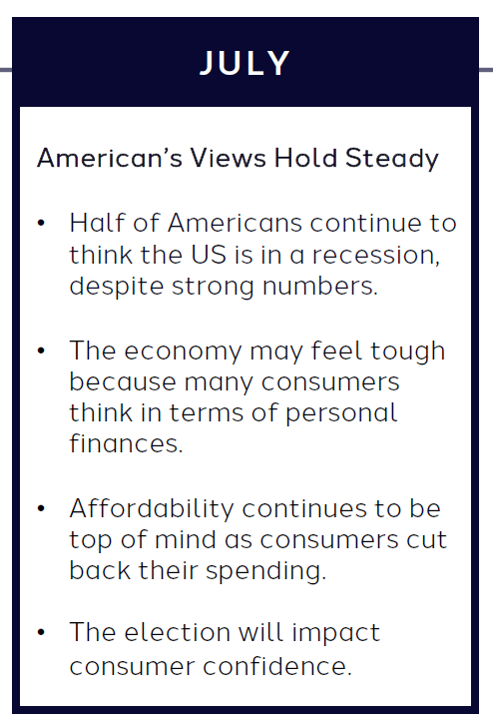People living in the U.S. continue to feel a “vibe-cession” malaise, based on the American Mindset July 2024 update from Dentsu’s Consumer Navigator research. 
Notwithstanding generally good news about the American macroeconomy — in terms of growth, downward ticking inflation, and expected interest rate relief come September from the Federal Reserve — one in two Americans still thinks the country is in a recession.
And this context is important for consumer’s personal spending on health care, fitness, and wellness, because, as Dentsu puts it, “consumers think in terms of personal finances.”
As the summary here asserts, affordability is top of mind as consumers cut back spending.
But those spending cutbacks do not impact all categories of household finances, shown in the next chart.
Consumers’ spending on food is taking the greatest hits across 3 categories of dining out, delivery and take-out, and fast food. 
But fitness and wellness? Not so much, with 18% of U.S. consumers spending more on their health versus 23% spending less or delaying purchases.
That delta of 6 percentage points is the lowest among all household spending line items except for furniture outlays. 
Health Populi’s Hot Points: Peoples’ views on financial health are deeply embedded in how consumers view their overall health and well-being — the many layers of personal health including:
- Physical health
- Mental health
- Appearance and looks (think beauty and personal care spending)
- Social health, and,
- Financial health.
The pie chart and bars here tells us that in the U.S., one-half of health citizens felt either in not very good shape or in terrible shape. Thus, on the right side of the chart, we see that about 16% of people said they struggled to afford “any” expenses, and another one in four were only able to afford some of their expenses — thus, consistent with the pie chart, only one-half of consumers were able to afford all of their expenses. 
With health care expenses having somewhat less elastic demand among consumers — that is, people not cutting those expenses as quickly as they might shift food to cooking at-home or moving to private label brands in the grocery store — people are less likely to cut spending as-such.
Still, we know patients as health consumers have been delaying necessary care and/or prescribed medicines due to cost in the past few years, a habit (or choice) present before the most recent inflationary era.
Dentsu, a marketing/comms company, offers three recommendations for marketers at the end of this wave of consumer research. I pulled one of the 3 here, recommending marketers “lead with empathy and understanding.”
As U.S. patients continue to own a role as health care payers, this advice is crucial across peoples’ touchpoints in their personal health ecosystems…from health plans to pharma, hospitals and doctors’ offices to over-the-counter medicines. And indeed, as consumers look to the promise of food-as-medicine, grocery stores and food manufacturers, as well.




 Thanks to Feedspot for naming this blog, Health Populi, as a
Thanks to Feedspot for naming this blog, Health Populi, as a I am so grateful to Tom Lawry for asking me to pen the foreword for his book, Health Care Nation,
I am so grateful to Tom Lawry for asking me to pen the foreword for his book, Health Care Nation,  I love sharing perspectives on what's shaping the future of health care, and appreciate the opportunity to be collaborating once again with Duke Corporate Education and a global client on 6th May. We'll be addressing some key pillars to consider in scenario planning such as growing consumerism in health care, technology (from AI to telehealth), climate change, and trust -- the key enabler for health engagement or dis-engagement and mis-information. I'm grateful to be affiliated with the corporate education provider
I love sharing perspectives on what's shaping the future of health care, and appreciate the opportunity to be collaborating once again with Duke Corporate Education and a global client on 6th May. We'll be addressing some key pillars to consider in scenario planning such as growing consumerism in health care, technology (from AI to telehealth), climate change, and trust -- the key enabler for health engagement or dis-engagement and mis-information. I'm grateful to be affiliated with the corporate education provider